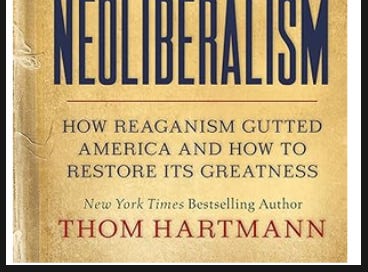Selling the Economic Theory of Neoliberalism -- Part II of The Grand Scheme of the Great Takeover
Next: Part III - Control the States
It started in 1848 when English philosopher/politician John Stuart Mill published "Principles of Political Economy."1
Neoliberalism, a term that has become synonymous with the economic policies of the late 20th century, has profoundly influenced global economies and political landscapes.
The development of neoliberalism is a complex process that spans several decades, characterized by the contributions of key thinkers such as John Stuart Mill, Milton Friedman, and Friedrich Hayek. Each played a significant role in shaping the philosophical and economic foundations of neoliberal thought.
Neoliberalism emerged as a response to the perceived inefficiencies of Keynesian economics and the welfare state, particularly during the economic turmoil of the 1970s. Advocating for free-market capitalism, minimal government intervention, and individual liberty, neoliberalism gained traction through the Mont Pelerin Society, established in 1947 by Friedrich Hayek and other scholars.
Key Figures in Neoliberal Thought
John Stuart Mill (1806-1873)
Contributions: Mill's Principles of Political Economy (1848) laid the groundwork for neoliberal thought by distinguishing between production laws and distribution, suggesting that societal institutions could alter distribution.
His advocacy for reforming property rights and examining socialist proposals positioned him as a precursor to later debates on economic systems. Mill's approach sought to reconcile liberal economics with social justice concerns, which would later be critiqued by neoliberal thinkers who favored less government intervention.
Friedrich Hayek (1899-1992)
Contributions: Hayek's The Road to Serfdom (1944) warned against central planning, advocating for spontaneous market order.
He founded the Mont Pelerin Society in 1947, which became a pivotal organization for neoliberal intellectuals. Hayek emphasized the concept of "spontaneous order," asserting that markets operate effectively without central direction, a principle that became central to neoliberal ideolog.
His later work, The Constitution of Liberty (1960), further developed his ideas on freedom and market dynamics, reinforcing his critique of government intervention in economic affairs.
Milton Friedman (1912-2006)
Contributions: Friedman championed neoliberal economics through works like Capitalism and Freedom (1962), advocating for economic freedom as essential to political freedom and promoting monetarism over Keynesian fiscal policies. He argued that economic freedom is essential for political freedom and that government should primarily focus on maintaining law and order while allowing markets to operate freely.
His development of monetarism provided a counterpoint to Keynesian economics, advocating for controlling money supply as a means to manage inflation rather than relying on fiscal policy.
Friedman’s ideas gained traction during the 1970s economic crises, contributing significantly to the shift toward neoliberal policies under leaders like Ronald Reagan and Margaret Thatcher.
The Rise of Neoliberal Capitalism
Neoliberal capitalism, characterized by deregulation, privatization, tax cuts, and free trade, gained prominence in the late 20th century. Leaders like Ronald Reagan and Margaret Thatcher implemented these principles, reshaping economic policies worldwide.
Impact on Global Economies and Societies
Neoliberal policies have driven economic growth and innovation but have also been criticized for increasing inequality and weakening social welfare systems. Critics argue that the concentration of wealth and erosion of social safety nets have led to significant social and political challenges.
Political Implications
Neoliberalism has influenced political landscapes, promoting limited government intervention and aligning closely with conservative ideologies. Its global spread has been facilitated by institutions like the IMF and World Bank, often tying financial aid to neoliberal reforms.
Criticisms and Challenges
Despite its initial success, neoliberalism faces criticism for prioritizing market efficiency over social equity and environmental sustainability. Economic crises, such as the 2008 financial meltdown, have prompted calls for reform and a reevaluation of neoliberal principles.
The Future of Neoliberal Capitalism
As the world grapples with new challenges, including climate change and post-pandemic recovery, the future of neoliberal capitalism is uncertain. There is a growing consensus on the need for policies that balance market efficiencies with social equity and sustainability.
Endnotes
1^: Principles of Political Economy. (2024, November 27). In {Wikipedia}. Link
Additional Sources:
[1]
[2] https://www.econlib.org/library/Columns/y2018/SchwartzMill.html
[3] https://economic-historian.com/2018/09/milton-friedman-free-market/
[4] https://www.tandfonline.com/doi/full/10.1080/00131857.2019.1696303
[5] https://lareviewofbooks.org/article/what-was-neoliberalism/
[6] https://en.wikipedia.org/wiki/Neoliberalism
[7] https://www.econlib.org/library/Columns/y2013/Schwartzneoliberalism.html
[8] https://academic.oup.com/book/26080/chapter-abstract/194065512?redirectedFrom=fulltext&login=false
[9] https://www.econlib.org/library/Enc/bios/Hayek.html
[10] https://democracyparadox.com/2021/08/09/neoliberalism-a-podcast-primer/
[11] https://www.tandfonline.com/doi/full/10.1080/00131857.2021.1951704
[12] https://hal.science/hal-04374002/document
[13] https://jacobin.com/2024/05/friedrich-von-hayek-freedom-neoliberalism-democracy
[14] https://my.vanderbilt.edu/anth232/files/2014/04/ABriefHistoryNeoliberalism-1.pdf
[15] https://oll.libertyfund.org/publications/liberty-matters/steven-kates-john-stuart-mill-political-economy
[16] https://www.project-syndicate.org/onpoint/neoliberalism-friedrich-von-hayek-milton-friedman-by-jeremy-adelman-2023-10
Acknowledgement: Parts of content created by AI sources, such as ChatGPT, Lex Writer, and Liner.



